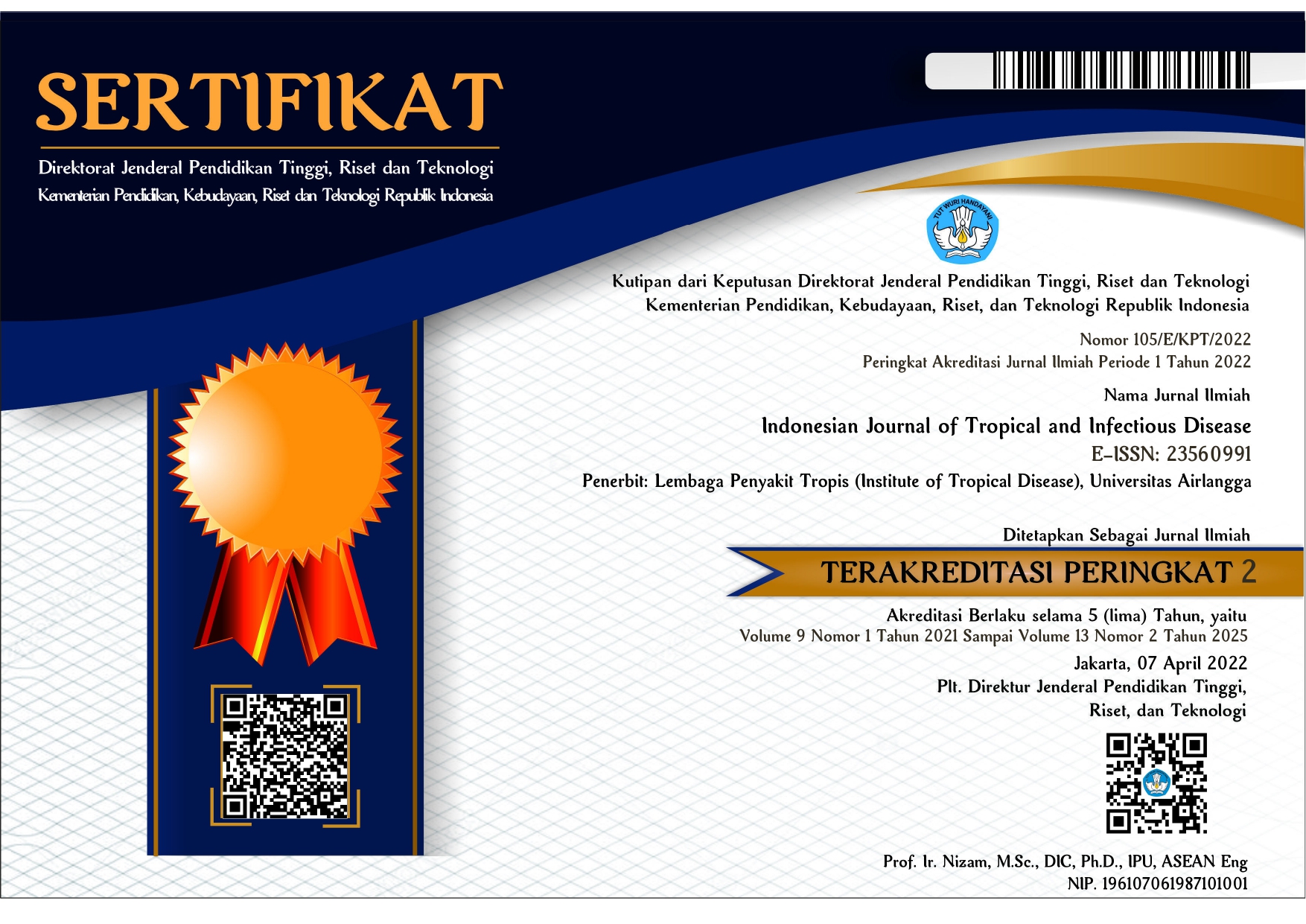Cognitive Behavior Change for the Improvement of Health Care, Cognitive Function and School Achievement in Helminth Infected Children
Downloads
Overall helminth infection prevalence in Central Java in 2002 was high (20–100%). Unfortunately, the knowledge, attitude and practice (KAP) of children and their parent's about worm infection were in general very low. Objective of this study was to determine the improvement of parents' health care behavior on helminth infected children by improving their KAP, in order to decrease re-infection rate of helminth infestation and improving school achievement. Design study is quasi experiment with pre and post test control group design on community participation toward school aged children in Sragen sub-district in Central Java. A sample of one hundred and thirty one of children deriving from a systematic random sampling was used in the study and divided into 66 children for intervention population and 65 children for control population. During the study, the children in selected area were given with 400mg chewable albendazole, and after a month, their stools were examined to find out the negatives. Parent's participation was needed in improving the KAP on re-infestation that was performed by an intervention using a module. Data were analysed using chi-square test to determine the
relationship between variables among groups. Stools were examined for the presence of geohelminth's egg using Kato-Katz Technique.
Three subject matters (Mathematics, Indonesian Language and Natural Science) were obtained by a special tool. Digit Span, Coding
and Stroop Test were used to determine the level of cognitive function. Monitoring and the ladder-snake game were use to observe the improvement of the behavior. It revealed that re-infestation of Ascaris lumbricoides, Trichuris trichhiura and Oxyuris vermicularis
occurs 2 times greater in control group, even there was no significant different. In both groups, there was no hookworm re-infestation.
A good knowledge and attitude can be predicted to be a better practice to prevent the re-infestation. Oxyuris vermicularic re-infection could have adverse effect on study Achievement (Mathematics, Indonesian Language and Natural Science) and The Cognitive Function, such as memory, attention, visual-motoric co-ordination. The moshly affected cognitive function was memory-based and specifically represented the components of the working memory. From the monitoring of health care behavior, this study found that the more convinced the mothers in changing their degree of family's health were, the higher the level of children's health was.
Andrea C., Rachel J., 1995, What is Participatory Research. Social Science Medicine, 41, 12, 1667–1676.
Beddeley A., Exploring the Central Executive, Quarterly Journal of Experimental Psychology 49A. 5–28.
Beddeley A., Exploring the Central Executive, Quarterly Journal of Experimental Psychology 49A. 5–28.
Bandura, A., 1977, Self Efficacy: "Toward a Unifying Theory of
Behaviour Change”. Psychological Review,. 84, 191–215.
Bulletin Mitra, 1997, MITRA, Bulletin Kemitraan Indonesia Untuk Perkembangan Anak . April, 2, 5.
Kato-Katz Technique, WHO, 1982, Programme on Intestinal Parasitic Infection, Division of Communicable Disease.
Max R., 1989, Stroop, Neuropsychological Screening Test Manual, Psychological Assessment Resources, Inc.
Nokes C., Bundy D., 1994, Does Helminth Infection Affect Mental Processing and Educational Achievement ? Parasitology Today, 10,4–8.
PCD, 1997, Partnership For Child Development, Report V:
Programme Monitoring and Evaluation, Collaboration between
Partnership for Child Development and Ministry of Health Indonesia, Semarang, Indonesia, 1997.
Rifkin S., 1994, Participatory Research and Health. Proceeding of the International Symposium on participatory Research in Health Promotion. Liverpool School of Hygiene and Tropical Medicine.
Rousham E.K., 1994, Perception and treatment of Intestinal Worms in Rural Bangladesh, Local Differences in knowledge and Behaviour, Social Science Medicine, 39, 8, 1063–1068.
Sakti H., Nokes C., Hertanto W., Sri H., Andrew H., Donald B., atoto, 1997, Evidence for Baseline Association between Helminth Infection on Cognition and Motor Function and Educational Achievement in Indonesia School-age Children, Journal of Tropical Medicine, 1999, May, 22, 223–229.
Sadjimin T., Rini J., 2000, Hubunganantara Infestasi Cacing dan Prestasi Belajar Anak Sekolah Dasar di Kecamatan Ampama Kota Kabupaten Poso Sulawesi Tengah, Jurnal Epidemiologi Indonesia, 4: 1: 17–26.
Satoto, Hertanto W.S., Sri H., 1996, Mitra, Partnership For Child Development”. Collaboration between Partnership for Child
Development and Ministry of Health Indonesia, Semarang, Indonesia, 1997.
Waters G.S., Caplan., 1996, The Measurement of verbal working memory capacity and its relation to reading comprehension. Quarterly Journal of Experimental Psychology 49 A, 51–65.
The Indonesian Journal of Tropical and Infectious Disease (IJTID) is a scientific peer-reviewed journal freely available to be accessed, downloaded, and used for research. All articles published in the IJTID are licensed under the Creative Commons Attribution-NonCommercial-ShareAlike 4.0 International License, which is under the following terms:
Attribution ” You must give appropriate credit, link to the license, and indicate if changes were made. You may do so reasonably, but not in any way that suggests the licensor endorses you or your use.
NonCommercial ” You may not use the material for commercial purposes.
ShareAlike ” If you remix, transform, or build upon the material, you must distribute your contributions under the same license as the original.
No additional restrictions ” You may not apply legal terms or technological measures that legally restrict others from doing anything the license permits.























